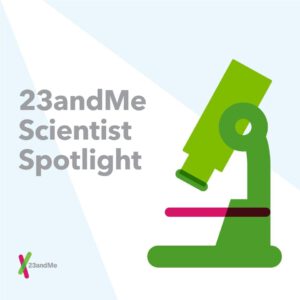This interview is part of an occasional series of profiles introducing you to the people behind 23andMe’s compelling research. Early in her career, Joanna Mountain, 23andMe’s Senior Director of Research studied the language and genetic diversity in Kenya. At 23andMe, Joanna still studies the genetic diversity of Africa, most recently as part of our African Ancestry projects, but she also spends time investigating how people react to their genetic results.

“Each tiny segment of the genome has a history.”
What are you working on at 23andMe?
One of my current areas of interest is learning more about how having access to genetic test results impacts people’s lives. We wanted to know how customers reacted to their genetic risk for breast cancer, for example, and what we found is that the test results prompted people to take positive steps, including talking to their doctors and discussing the results with family members.
We’re currently looking at similar research in people with genetic risk of venous thromboembolism.
Our team is also researching genetic factors that influence how people respond to medications. Preliminary findings show that people report a very short list of side effects to a variety of drugs, with the most common being hives and stomach pain. My colleague, David Hinds presented on the topic of opioid-induced vomiting at last year’s American Society of Human Genetics meeting in Boston and we expect to publish further research this year.
Originally from:
Fanborough, Hampshire, England
Education:
BS in Mathematical Sciences, Stanford
PhD in Genetics, Stanford
Post Doc, University of California, Berkeley
Fun fact:
Joanna played on Stanford’s women’s soccer team when it was a club level sport. Now she plays on 23andMe’s soccer team, Unzipped Genes.
How does your research in Africa apply to your work at 23andMe?
I am very interested in the great depth of genetic diversity in African populations. Because our species has lived in Africa for so long, it impacts our ability to tell African Americans where their ancestors are from. Many African Americans hit a brick wall when they start researching their genealogy, but where there aren’t paper records, we hope genetics will be able to fill in the gaps.
Why are you excited about genetics?
I was first studying applied math, and there’s a lot of math in population genetics. Being able to predict what will happen over the course of generations is a cool application of math, and I was initially drawn to that.
Tell us about a recent breakthrough in genetics research that you think will have a big impact.
Today, huge numbers of people are participating in genetic research. By providing researchers with information about your health and ancestry, we can do so much. We’re getting closer to understanding human prehistory and the genetic factors and history of disease, for example. 23andMe’s customers contribute to that, and future generations will benefit in the long run.
What’s one thing the average person should know about genetics?
Each tiny segment of the genome has a history. And every section that we compare can be traced back to your ancestors. When 23andMe calculates your Ancestry Composition, that’s a valuable concept. What we’re really trying to do is pick out the history of each segment to show to which regions you’re most closely connected.
What interesting thing have you learned about yourself from being tested?
I really enjoyed comparing my children to their grandparents using 23andMe. My mother and mother-in-law have both been tested and therefore we can trace from all four grandparents to our sons’ DNA to see exactly where their blue eyes come from. More importantly, it connects my sons to people who are important to their lives, but they never had the opportunity to meet.